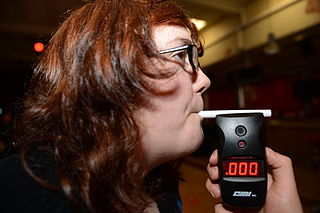Back in May, the National Transportation Safety Board (NTSB) announced that it wants all states to lower the legal limit of blood-alcohol content (BAC) from 0.08 to 0.05 percent for DUI charges to apply. BAC is recorded via breathalyzer at the time of a DUI stop and used as evidence against the accused if and when the chargers are brought before judge.
The NTSB claims that instituting this change would significantly lower injury and death due to drunk driving. However, there are groups opposed to the notion that lowering the limit would be a waste of useful law enforcement. The facts as they stand:
-
 There are 10,000 alcohol related deaths a year
There are 10,000 alcohol related deaths a year - Alcohol-related deaths are 1/3 of road deaths
- A 170 pound male may reach a BAC of .06% after three drinks in an hour
- A 130 pound female may reach a .06 % BAC after two drinks in an hour
The NTSB did research which revealed, “Most drivers experience a decline in both cognitive and visual functions with a BAC of 0.05… A new National Highway Traffic Safety Administration (NHTSA) chart shows a person with a 0.05 BAC level experiences reduced coordination, reduced ability to track moving objects, difficulty steering, and reduced response to emergency driving situations."
Mothers Against Drunk Driving (MADD) founder, Candace Lightner, shared her concerns, stating, "I don't believe it is a practical long-term solution… it won't be enforced and will be a waste of time… Running around trying to arrest everyone at 0.05 is impractical.” She has a point… sometimes, mother knows best. She went on to say that the change would be “…very hard to prosecute in part because many of those drivers would pass a field sobriety test, leaving only subjective evidence of impairment.”
Also, Stephen Talpins, a Miami attorney who spent 12 years as a prosecutor in the Florida state attorney's office before leading the National Traffic Law Center and serving as MADD's public policy director, asked, “Do we want to criminalize someone having a 0.05 BAC who does not appear impaired to anyone?"
As a counter argument, NTSB staffer Robert Molloy says, “Currently, more than 100 countries on six continents have BAC limits set at 0.05 or lower.” says the BAC number will drop eventually, it’s just a matter of time. It is estimated that the BAC reduction would save 500-800 lives a year.
Ultimately, the matter is a decision each individual state will have to eventually make. While the matter is still up for debate, it seems that with a slight push by the NTSB, the many places will end up with an answer of “Yes.” As long as the NTSB continues pushing for these initiatives, policy makers must eventually decide whether or not to reduce the BAC impairment limit to 0.05.
How do you feel about lowering the BAC limit? Will the change be effective in reducing drunk driving accident rates?




